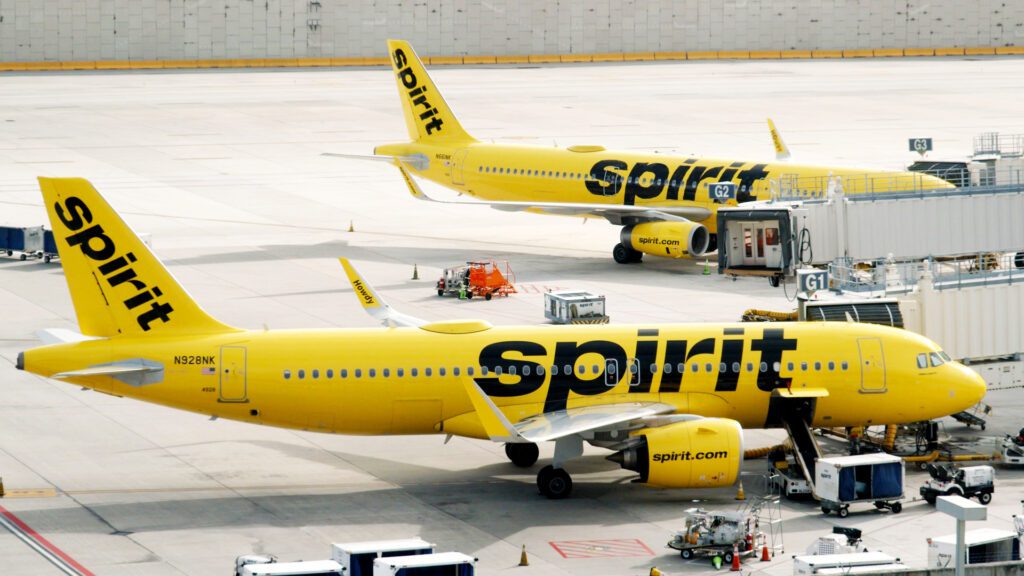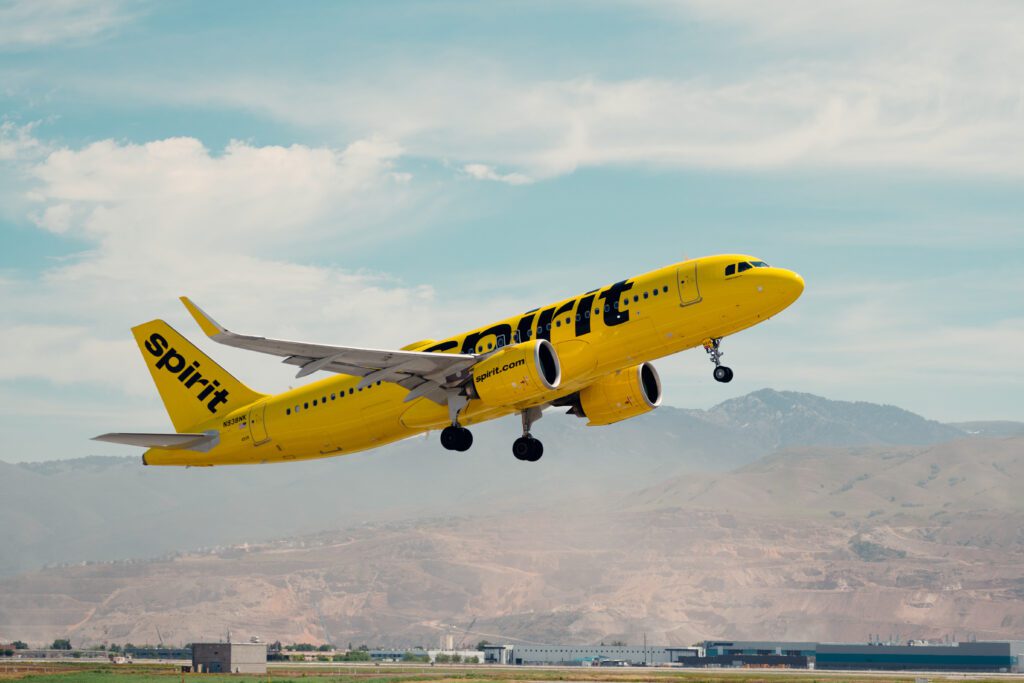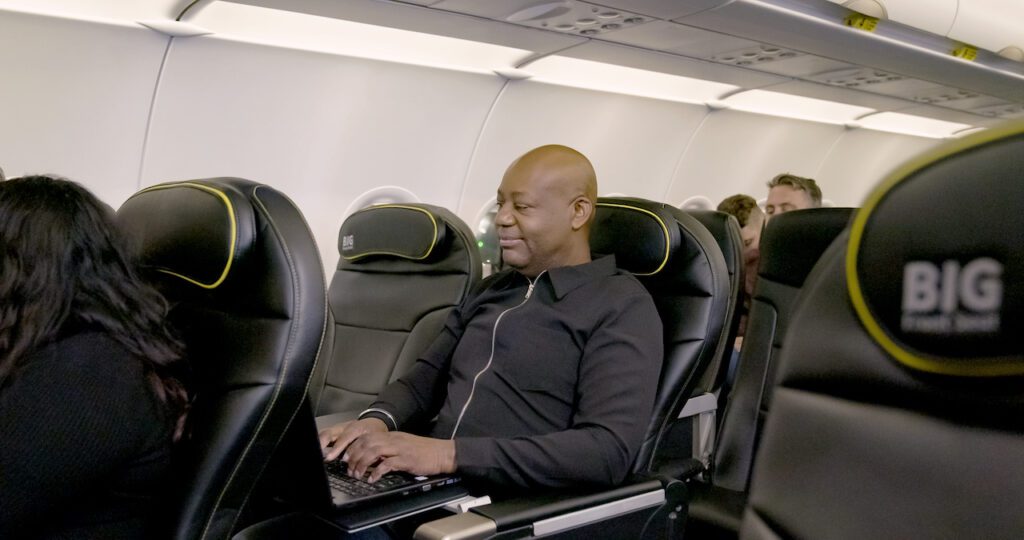Spirit Airlines Rolls Out New FlytLIVE In-Flight Connectivity Service


Spirit Airlines released this and a series of other images Wednesday showing its A320 and A321 fleet equipped with new antennas and radomes connecting passengers to its FlytLIVE in-flight internet service, which became available for the first time on July 13. (Photo courtesy of Spirit Airlines)
Spirit Airlines has begun providing in-flight internet services to its passengers across most of its Airbus A320 and A321-operated flights, according to a July 13 announcement.
The rollout of in-flight connectivity (IFC) by Spirit comes following several years of delays in getting the service launched, with the Miramar, Florida-based low-cost airline’s former president Ted Christie initially targeting mid-2019. Starting today, passengers now have the ability to connect to Spirit’s IFC service using the Thales “FlytLIVE” cabin portal that the Toulouse-based company describes as a platform that supports “full Internet services including video streaming, games, social media and live television” to passengers.
The service is currently active across all of Spirit’s A320 and A321 aircraft, with expansion to their A319 fleet expected to occur at a future date that is not yet determined. According to Thales, FlytLIVE is enabled by a set of strategic agreements first established with satellite operators SES and Hughes Network Systems in 2017. Under the agreements, SES contracts Hughes for service on EchoStar XVII and EchoStar XIX HTS satellites, and combines them with its AMC-15 and AMC-16 satellites to provide the four-satellite network initially enabling connectivity for Spirit passengers.
A fifth satellite, SES-17, was confirmed as operational by the U.K.-based operator on June 16. SES-17 is a High Throughput System (HTS) Geostationary Earth Orbit (GEO) satellite, the first operated by SES to feature a totally digital payload. It features 200 spot-beams that can be dynamically adjusted and aligned to changing customer needs.

“This is a real groundbreaking moment in the industry as Spirit adds in-flight amenities and product options that have previously not been available on ultra-low fare carriers.” – Matt Klein, Executive Vice President and Chief Commercial Officer for Spirit Airlines. (Photo courtesy of Spirit Airlines)
Spirit is claiming that once FlytLIVE starts leveraging the SES-17 satellite’s capabilities, its in-flight internet experience will “offer the best availability in the Americas and will be faster than other airlines based on published data.”
IFC purchasing options for Spirit passengers have been separated into a browsing category that starts at $2.99 and a streaming category that starts at $5.99. Pricing for both options increases based on the duration of the flight, with Spirit also claiming that the streaming option is “20x faster than our browsing option.”
In a separate press release announcing the availability of the new service, Thales claims FlytLIVE will deliver “ultra-high speeds of up to 400 Mbps” to Spirit aircraft.
The FlytLIVE service will initially be available on the majority of the routes operated by Spirit, with the exception of select routes in the Caribbean Islands, as well as Central and South America. Once FlytLIVE connects to the SES-17 satellite however, the service is expected to expand to all routes operated by Spirit.

“The system’s reliability and performance is getting rave reviews from Spirit’s passengers who can now stream to their heart’s content.” – TK Kallenbach, CEO Thales InFlyt Experience
Matt Klein, Executive Vice President and Chief Commercial Officer for Spirit Airlines, commenting on the go-live date of satellite connectivity featured on passenger-carrying flights, calls it a “groundbreaking moment in the industry as Spirit adds in-flight amenities and product options that have previously not been available on ultra-low fare carriers.”
Spirit now joins Southwest, JetBlue, and Breeze Airways as the only U.S.-based low-cost carriers providing—or committed to in the case of Breeze—in-flight internet service. Avelo, the California-based low cost carrier launched last year, has previously told Avionics International that it will eventually equip its fleet with IFC. A representative for Frontier has also previously told Avionics the weight and cost of the equipment prevents them from investing in IFC, while Allegiant and Sun Country have remained open to the possibility of eventually connecting their passengers to in-flight internet.
The post Spirit Airlines Rolls Out New FlytLIVE In-Flight Connectivity Service appeared first on Aviation Today.
—————
Boost Internet Speed–
Free Business Hosting–
Free Email Account–
Dropcatch–
Free Secure Email–
Secure Email–
Cheap VOIP Calls–
Free Hosting–
Boost Inflight Wifi–
Premium Domains–
Free Domains





